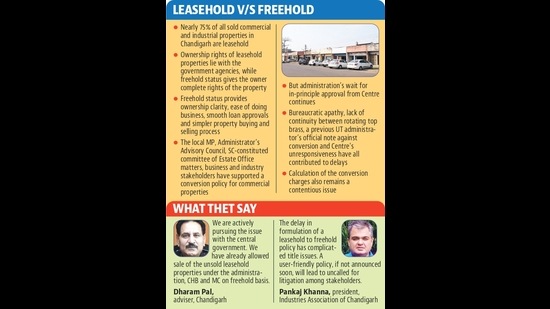Chandigarh Policy Pangs | Leasehold to freehold policy blueprint remains on paper
While a conversion policy for residential properties exists since 2017, that for sold commercial units has been hanging fire for three decades, leaving Chandigarh’s business and industrial community struggling with a web of troubles
For three long decades, the Chandigarh administration has been toing and froing on a comprehensive policy for conversion of sold commercial leasehold properties to freehold.

Nearly 70% commercial and industrial plots in the city are leasehold, allowing occupation for a limited period, mostly 99 years, with government agencies holding the ownership rights.
Apart from a web of legal complications, the allottees struggle with their sale and purchase, and raising a mortgage when needed, troubles normally not associated with freehold properties where the allottee is the real owner.
The administration has offered the lessees a ray of hope multiple times by agreeing to frame a policy to convert leasehold properties to freehold after payment of conversion charges. But till date, it has failed to take practical shape.
When the administration finally decided to allow conversion in 2021, the ball went in the court of the Union ministry of home affairs (MHA) that, a year later, has yet to accord its approval.
“Even after the approval comes, the administration will need more time to formulate a policy, which it may again submit with the Centre for its nod. Thereafter, deciding the rate of conversion will be another daunting task,” said a UT official.
While a conversion policy for residential leasehold properties is already in place in the city since 2017, residents complain that in effect, it also remains on paper due to exorbitant conversion charges that vary from 12% to 15% of the consideration amount.
The legal mess
The UT administration started selling properties on leasehold basis after 1967, particularly commercial and industrial plots.
Ownership rights in this case are with government agencies like the UT Estate Office, municipal corporation and Chandigarh Housing Board. Besides, there is a lock-in period of 15 years after allotment, not allowing the lessee to transfer the property.
“In the Industrial Area, the last allotments were done in the 1980s. So, the lock-in period of most industrial plots ended in late 1990s. But people still could not transfer these properties as the administration did not come up with a transfer policy for more than a decade,” said Naveen Manglani, president, Chambers of Chandigarh Industries.
Even after the transfer policy was put in place, not many opted for it due to the “high” unearned charges. The unearned increase is the difference between the price paid by the original allottee and the market value at the time of permission of transfer. It is paid before registry of such sale or transfer.
“Nearly, 70% to 80% of properties in the Industrial Area have been transferred on General Power of Attorney, creating a major legal mess,” said Manglani.

Long-pending demand
The administration is said to be working on a conversion policy for commercial properties since mid-1990s. After the demand for conversion policy gained strengthened in the 2000s, the administration’s assurances on it also increased.
“The administration has for long agreed with the need for a conversion policy for the industrial and commercial properties on the lines of residential properties. But a major setback to the demand came when a UT administrator made official remarks against conversion,” said a UT official.
Meanwhile, the business and industrial community’s demand for the right to own properties to facilitate expansion and loans has increased.
The Chandigarh Industrial Policy also promises allowing conversion of industrial plots from leasehold to freehold to promote ease of doing business in the city, an idea also favoured by the Administration’s Advisory Council and repeatedly supported by member of Parliament Kirron Kher.
“The administration has been pursuing the MHA for in-principle approval so that work on the policy can begin. The UT adviser has also been personally taking up the matter with the ministry officials,” said a UT official.





